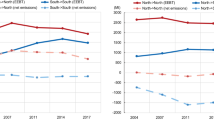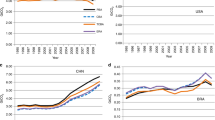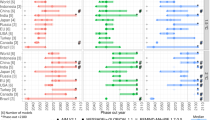Abstract
Net emissions transfers via international trade from developing to developed countries have increased fourfold in the past two decades—from 0.4 GtCO2 in 1990 to 1.6 GtCO2 in 20081. Consumption of goods and services in developed countries is one of the main driving forces of those emissions transfers2,3. Therefore several proposals have been made to assign the responsibility for those emissions to the beneficiary, that is, to the consumer4,5,6. Although consumption-based analyses have become popular7,8,9, few proposals have been made for integrating emissions transfers into actual policy making. This study advances and critically evaluates three potential policy options that could be integrated in the climate-policy framework of developed countries. An energy–economic model with global coverage is used for the analysis. I find that connecting emissions transfers to international offset responsibilities is the most promising option from an environmental and economic perspective and may provide another rationale for international climate finance. The two alternative policy options of adjusting domestic emissions targets in developed countries and of implementing carbon-related tariffs and export subsidies are found to be environmentally ineffective in the latter case and economically detrimental, especially for developing countries, in both cases.
This is a preview of subscription content, access via your institution
Access options
Subscribe to this journal
Receive 12 print issues and online access
$209.00 per year
only $17.42 per issue
Buy this article
- Purchase on Springer Link
- Instant access to full article PDF
Prices may be subject to local taxes which are calculated during checkout

Similar content being viewed by others
References
Peters, G., Minx, J., Weber, C. L. & Edenhofer, O. Growth in emission transfers via international trade from 1990 to 2008. Proc. Natl Acad. Sci. USA 108, 8903–8908 (2011).
Hertwich, E. G. & Peters, G. P. Carbon footprint of nations: A global, trade-linked analysis. Environ. Sci. Technol. 43, 6414–6420 (2009).
Davis, S. J. & Caldeira, K. Consumption-based accounting of CO2 emissions. Proc. Natl Acad. Sci. USA 107, 5687–5692 (2010).
Rose, A. Reducing conflict in global warming policy: The potential of equity as a unifying principle. Energy Policy 18, 927–935 (1990).
Munksgaard, J. & Pedersen, K. A. CO2 accounts for open economies: Producer or consumer responsibility?. Energy Policy 29, 327–334 (2001).
Ferng, J-J. Allocating the responsibility of CO2 over-emissions from the perspectives of benefit principle and ecological deficit. Ecol. Econ. 46, 121–141 (2003).
Wiedmann, T., Lenzen, M., Turner, K. & Barrett, J. Examining the global environmental impact of regional consumption activities—Part 2: Review of input–output models for the assessment of environmental impacts embodied in trade. Ecol. Econ. 61, 15–26 (2007).
Wiedmann, T. A review of recent multi-region input–output models used for consumption-based emission and resource accounting. Ecol. Econ. 69, 211–222 (2009).
Jakob, M. & Marschinski, R. Interpreting trade-related CO2 emission transfers. Nature Clim. Change 3, 19–23 (2012).
Muradian, R., O’Connor, M. & Martinez-Alier, J. Embodied pollution in trade: Estimating the ‘environmental load displacement’ of industrialised countries. Ecol. Econ. 41, 51–67 (2002).
Wyckoff, A. W. & Roop, J. M. The embodiment of carbon in imports of manufactured products: Implications for international agreements on greenhouse gas emissions. Energy Policy 22, 187–194 (1994).
Peters, G. P. & Hertwich, E. G. CO2 embodied in international trade with implications for global climate policy. Environ. Sci. Technol. 42, 1401–1407 (2008).
Fischer, C. Trade’s growing footprint. Nature Clim. Change 1, 146–147 (2011).
Springmann, M., Zhang, D. & Karplus, V. J. Consumption-based Adjustment of China’s Emissions-Intensity Targets: An Analysis of Its Potential Economic Effects Report 241 (MIT Joint Program on the Science and Policy of Global Change, 2013)
Gillenwater, M. & Seres, S. The Clean Development Mechanism: A review of the first international offset programme. Greenhouse Gas Meas. Manag. 1, 179–203 (2011).
Anger, N., Böhringer, C. & Moslener, U. Macroeconomic impacts of the CDM: The role of investment barriers and regulations. Clim. Policy 7, 500–517 (2007).
Babiker, M. H. & Rutherford, T. F. The economic effects of border measures in subglobal climate agreements. Energy J. 26, 99–125 (2005).
Böhringer, C., Carbone, J. C. & Rutherford, T. F. Embodied Carbon Tariffs NBER Working Paper 17376 (National Bureau of Economic Research, 2011).
Winchester, N., Paltsev, S. & Reilly, J. M. Will border carbon adjustments work?. BE J. Econ. Anal. Policy 11, 7.1–7.27 (2011).
Springmann, M. Carbon tariffs for financing clean development. Clim. Policy 13, 20–42 (2013).
Böhringer, C., Rutherford, T. F. & Wiegard, W. Computable General Equilibrium Analysis: Opening A Black Box Discussion Paper No. 03-56 (Zentrum für Europäische Wirtschaftsforschung (ZEW), 2003).
Bergman, L. in Handbook of Environmental Economics Vol. 3 (eds Mäler, K-G. & Vincent, J. R.) Ch. 24, 1273–1306 (Elsevier, 2005).
Wing, I. S. in International Handbook On The Economics Of Energy (eds Evans, J. & Hunt, L. C.) 332–366 (Edward Elgar, 2009).
Hazilla, M. & Kopp, R. J. Social cost of environmental quality regulations: A general equilibrium analysis. J. Polit. Econ. 98, 853–873 (1990).
Winchester, N. The impact of border carbon adjustments under alternative producer responses. Am. J. Agr. Econ. 94, 354–359 (2012).
Interagency Working Group on Social Cost of Carbon Social Cost of Carbon for Regulatory Impact Analysis under Executive Order 12866 (United States Government, 2010).
Interagency Working Group on Social Cost of Carbon Technical Update of the Social Cost of Carbon for Regulatory Impact Analysis Under Executive Order 12866 (United States Government, 2013).
Narayanan, B., Aguiar, A. & McDougall, R. (eds) in Global Trade, Assistance, and Production: The GTAP 8 Data Base (Center for Global Trade Analysis, Purdue University, 2012).
Levin, K. & Bradley, R. Comparability of Annex I Emission Reduction Pledges WRI Working Paper (World Resources Institute, 2010).
Böhringer, C., Rutherford, T. F. & Springmann, M. Clean-development Investments: An Incentive-compatible CGE Modelling Framework Oldenburg Discussion Papers in Economics (University of Oldenburg, 2013).
Acknowledgements
I thank C. Böhringer and T. F. Rutherford for their methodological input, and G. Peters for extensive feedback. I also want to thank the participants of an EMF-29 workshop in Oslo for their feedback on an earlier version of this article. The study was supported by a doctoral grant from the AXA Research Fund, which is gratefully acknowledged.
Author information
Authors and Affiliations
Corresponding author
Ethics declarations
Competing interests
The author declares no competing financial interests.
Supplementary information
Rights and permissions
About this article
Cite this article
Springmann, M. Integrating emissions transfers into policy-making. Nature Clim Change 4, 177–181 (2014). https://doi.org/10.1038/nclimate2102
Received:
Accepted:
Published:
Issue Date:
DOI: https://doi.org/10.1038/nclimate2102
This article is cited by
-
Exploring the consumption-based carbon emissions of industrial cities in China: a case study of Tianjin
Environmental Science and Pollution Research (2021)
-
The cascade of global trade to large climate forcing over the Tibetan Plateau glaciers
Nature Communications (2019)
-
Consumption-based greenhouse gas emissions accounting with capital stock change highlights dynamics of fast-developing countries
Nature Communications (2018)
-
A multi-tiered approach for assessing the forestry and wood products industries’ impact on the carbon balance
Carbon Balance and Management (2015)
-
National greenhouse-gas accounting for effective climate policy on international trade
Nature Climate Change (2015)



